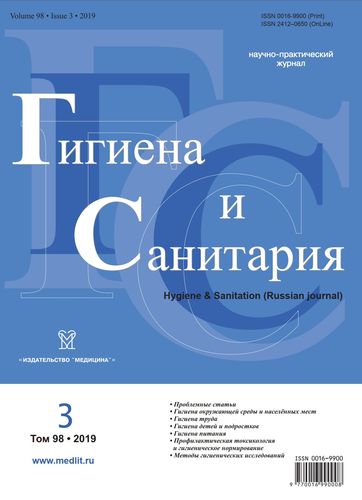Hygienic evaluation of innovative educational technologies in primary school
- Authors: Kuchma V.R.1, Tkachuk E.A.2, Shisharina N.V.3, Podlinyaev O.L.3
-
Affiliations:
- National Medical Research Center of Children’s Health»
- Angarsk branch of the East Siberian Scientific Center
- Irkutsk State University
- Issue: Vol 98, No 3 (2019)
- Pages: 288-293
- Section: HYGIENE OF CHILDREN AND ADOLESCENTS
- Published: 14.10.2020
- URL: https://vestnik.nvsu.ru/0016-9900/article/view/640206
- DOI: https://doi.org/10.47470/0016-9900-2019-98-3-288-293
- ID: 640206
Cite item
Full Text
Abstract
introduction. The paper presents hygienic approaches to the development of methods for the hygienic assessment of pedagogical technologies in terms of the safety for the health of pupils and effectiveness in terms of improving the quality of education. The aim of the study was a hygienic assessment of innovative technologies of enrichment in primary school.
Material and methods. The pupils of primary classes of the second year of the education were examined in two educational organizations of the city of Irkutsk. One group of children was trained according to enrichment training technology (60 children), the second – to a typical general education program (65 children). A total of 125 children were examined during the second year of study. The hygienic factors of the organization of the educational process were studied using the methodology for assessing the intensity of the educational work, the conditions for organizing the educational process, as well as texts of textbooks for readability (the Flash index) and the understanding of texts (Fog index). The obtained data are compared with the main criteria of the state of neuropsychic development of children: intellectual development (according to the method of Raven’s test with the definition of abilities to isolate relationships, analogies, rearrangement, decomposition and progressive change in the matrix of figures), mental performance (according to the method by V.Ya. Anfimov), short-term memory (Ray test).
Results. With the innovative technology of teaching, the intensity of the training work was established to be approaching the third degree of intensity of the training work by the criterion of intellectual loads: 2.9 ± 0.16 points with enrichment training technology and 2.2 ± 0.09 points in the conditions of training under the standard program p < 0.05). Indices of the sensory and emotional intensity of the educational work with the technology of enriched learning were statistically higher also (p < 0.05). The increase in the intensity of the educational work was accompanied by a decrease in intellectual development, short-term memory and mental performance (p < 0.05). Conclusions were made about the need for a comprehensive hygienic assessment of the safety for health and the effectiveness of innovative pedagogical technologies based on the developed methodology.
Conclusion. It is proposed to allow using pedagogical technology in educational organizations only after hygienic examination of its approbation in the educational process.
About the authors
Vladislav R. Kuchma
National Medical Research Center of Children’s Health»
Author for correspondence.
Email: kuchmavr@nczd.ru
ORCID iD: 0000-0002-1410-5546
MD, Ph.D., DSci., Professor, head of the Research Institute of hygiene and health care of children and adolescents of the National Medical Research Center of Children’s Health», Moscow, 105064, Russian Federation.
e-mail: kuchmavr@nczd.ru
Russian FederationE. A. Tkachuk
Angarsk branch of the East Siberian Scientific Center
Email: noemail@neicon.ru
ORCID iD: 0000-0001-7525-2657
Russian Federation
N. V. Shisharina
Irkutsk State University
Email: noemail@neicon.ru
ORCID iD: 0000-0002-2246-3407
Russian Federation
O. L. Podlinyaev
Irkutsk State University
Email: noemail@neicon.ru
ORCID iD: 0000-0002-6633-3997
Russian Federation
References
- Kuchma V.R., Stepanova M.I. Stress in schoolchildren: causes, consequences, prevention. Medicina truda i promyshlennaja jekologija. 2001; 8: 32–7.
- Osipova S.I., Baranova I.A., Ignatova V.A. Informatization of education as an object of pedagogical analysis. Fundamental’nye issledovanija. 2011; 12 (3): 506-10.
- Kolmagorova, A. V. Screening assessment of mental health at an early age. Psihoterapija. 2007; 2: 13-4.
- Kuchma V.R., Zvezdina I.V., Zhigareva N.S. Medical and social aspects of the formation of health of younger students. Voprosy sovremennoj pediatrii. 2008; 7(4): 9–12.
- Tkachuk E.A. Indicators of mental performance of children of preschool age in Irkutsk in the conditions of informatization of society. Kazanskij medicinskij zhurnal. 2013; XSIV (6): 864-6.
- Tkachuk E.A., Myl’nikova I.V., Efimova N.V. Hygienic assessment of the intensity of schoolchildren’s educational work. Jekologija cheloveka. 2014; 6: 20-4.
- Shisharina N.V. Technology enriching learning: theory and practice: teaching aid. [Tehnologija obogashhajushhego obuchenija: teorija i praktika: uchebno-metodicheskoe posobie]. Irkutsk: Izd. Irkut. gos. ped. un-ta; 2008; 204 p.
- Kuchma V.R., Efimova N.V., Tkachuk E.A. Hygienic assessment of students ’academic work intensity (methodical recommendations). [Gigienicheskaja ocenka naprjazhennosti uchebnogo truda obuchajushhihsja (metodicheskie rekomendacii)]. Irkutsk; 2014; 24 p.
- Tkachuk E.A. Problems of evaluation of educational texts (monograph). [Problemy ocenki uchebnyh tekstov (monografija)]. Irkutsk: Izd. IrGTU; 2009; 85 p.
- Tkachuk E.A. Evaluation of information and psychological security of school textbooks. Profilakticheskaja medicina. 2014; 2 (51): 69–72.
- Rogov E.I. Handbook of practical psychologist in education: Textbook. [Nastol’naja kniga prakticheskogo psihologa v obrazovanii: Uchebnoe posobie]. M.: Prosveshhenie: VLADOS. 1996. 529 p.
- Kuchma V. R. Hygiene of children and adolescents: a textbook. [Gigiena detej i podrostkov: uchebnik]. M.: GJeOTAR-Media; 2008.
- Podlinjaev O.L. Effective memory. [Jeffektivnaja pamjat’]. Irkutsk: izd. IGU; 2016; 199 p.
- Gafurova N.V. Modern problems of science and education. [Sovremennye problemy nauki i obrazovanija]. 2012; 3: URL: www.science-education.ru/103-6199 (Available at: 08.03.2018).
- Babanskij Ju. K. Selected pedagogical works: scientific publication. [Izbrannye pedagogicheskie trudy: nauchnoe izdanie]. M.: Pedagogika. 1989; 560 p.
Supplementary files









